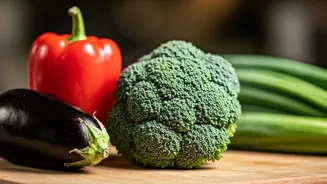Fatty Liver Basics
Fatty liver disease, characterized by the accumulation of excess fat in the liver, is a growing health concern. It often presents with subtle or no initial
symptoms, making early detection challenging. This condition can progress, potentially leading to inflammation, liver damage, and more serious ailments. Several factors contribute to fatty liver disease, including obesity, high cholesterol, and insulin resistance. Dietary adjustments, especially the inclusion of specific vegetables, can significantly aid in managing and reversing this condition. These vegetables work in several ways to support liver health, from reducing fat deposits to fighting inflammation and promoting overall liver function. A diet rich in these vegetables can be a significant step towards improving health.
The Power of Greens
Leafy green vegetables are excellent for liver health due to their high fiber and antioxidant content. Vegetables like spinach, kale, and other dark, leafy greens contain compounds that can detoxify the liver and reduce inflammation. These greens are also packed with vitamins and minerals that support liver function. Eating a variety of leafy greens can help protect the liver from damage and aid in fat metabolism. Including these vegetables regularly in meals offers a simple yet impactful way to improve your liver's condition. Aim to incorporate leafy greens into your daily diet through salads, smoothies, or cooked dishes to maximize benefits. Their easy accessibility and versatility make them a convenient addition to any health-conscious diet.
Cruciferous Crusaders
Cruciferous vegetables such as broccoli, cauliflower, and Brussels sprouts are strong allies in the battle against fatty liver disease. These vegetables are rich in glucosinolates, which the body converts into compounds that aid detoxification processes. Cruciferous veggies also contain antioxidants that protect the liver from oxidative stress and reduce inflammation. Regular consumption of these vegetables can help improve liver function and reduce the risk of further complications. Consider adding these vegetables to your meals through roasting, steaming, or stir-frying to enjoy their benefits fully. Incorporating cruciferous vegetables can significantly contribute to better liver health and overall well-being, enhancing your body's natural detoxifying processes.
All About Garlic
Garlic has been shown to have a positive impact on liver health, making it a valuable addition to your diet. It contains allicin, a compound with potent antioxidant and anti-inflammatory properties that can help protect the liver from damage and reduce fat buildup. Garlic has also shown the ability to lower cholesterol levels, which can further benefit liver health. Incorporating garlic into your meals is easy – add it to sauces, marinades, or roasted vegetables. Regular consumption of garlic can help support liver function and provide extra protection against disease. For added benefits, consider using fresh garlic, as it offers the highest concentration of beneficial compounds. The regular intake of garlic might not only enhance liver health but also boost the immune system.
Citrus for Liver
Citrus fruits like lemons and grapefruits are beneficial for liver health because they are rich in vitamin C and antioxidants. They support detoxification processes and protect liver cells from damage. The antioxidants in citrus fruits help neutralize free radicals, thereby reducing oxidative stress on the liver. Additionally, citrus fruits aid in the digestion of fats, supporting the liver's function. Enjoy citrus fruits in various ways, such as in your morning drinks, salads, or as a snack. Their versatility makes them a simple way to boost your daily nutrient intake and enhance liver function. Using these fruits can be a delicious and effective method to improve your overall health and liver well-being.














